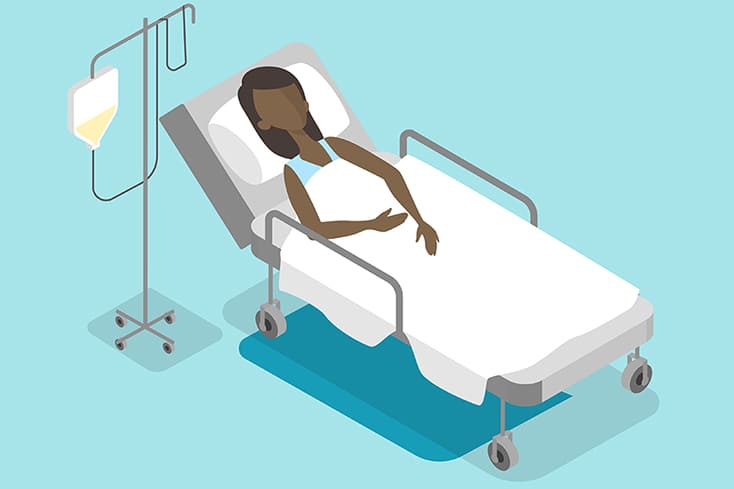February 05, 2021
By JoEllen Smith

I woke up feeling like I was lying in a hospital bed, but I could not open my eyes to confirm. I wanted to see where I was and sit up, but I was also paralyzed.
My arms felt like rubber when I attempted to move them. My eyes felt glued shut. My legs refused my orders to move. I was terrified. I could hear the familiar voices inside my head panicking.
If I was in a hospital, I could call out for a nurse. But my mouth would not open. To make matters worse, a horror film was playing on a huge screen in my mind. The film played scenes, sights, odors and screams of my own childhood tortures.
Since I could not make my body move, I attempted to force my brain into reality and away from the internal agonizing terror. “Okay,” I thought above the internal noise, I forced myself to remember facts, “I am a 42-year-old female. I am in a hospital, specifically a psychiatric ward.”
I started to remember the previous couple of days, of patients shuffling around, and the dreaded intake interview. All those deeply personal questions stirred up past terrors. Revisiting those raw experiences labored my breathing, made my head spin and trembled my body.
“I need help!” I screamed, but unfortunately the scream was in my head. Now, I was really helpless. I felt like I might be dying, and if I was, no one would notice. I could hear staff and patients outside my room, but no one checked in on me for a while.
Finally, I heard a staff member at my bedside tell me she was going to take my vitals. She wrapped the cuff around my arm, recorded my blood pressure and left my bedside. My heart sank. Hadn’t she noticed or cared about my lack of verbal response? Then, a man’s voice introduced himself as a doctor, called my name and told me to respond to his questions.
I was really trying to respond to him and escape the catatonic-like hold on my brain. Internally, I cried partly from relief for his help and partly because I was helpless to respond. The doctor sounded concerned and began roughly thumping on my sternum while saying my name. Then he picked up one of my arms that dropped limply to the bed. My hope of escape began to revive. The cries and screams in my mind started to fade far away. I became aware that there were more staff around my bed waiting for a response from me.
“They are trying to help me. Thank God, someone is trying to help me come back. I won’t die. I won’t die.”
The doctor then lifted my other wrist and as my arm started to drop to the bedside, I caught it. My muscles finally obeyed my mind’s orders. I could finally move! I squeezed open my eyes into the frown of a rather confused looking doctor who snapped off his stethoscope, walked away, shook his head and reported over his shoulder to the staff, “she was just faking it.”
“What!? He doesn’t believe me?” Shame, embarrassment and abandonment flooded through me. Too humiliated for anyone to see me, I pulled the cover over my head and cried. Beneath the covers, I shook, alone and unbelieved again. Just as in my childhood. No one had ever believed my reports. This time, no one believed my mind had paralyzed me, even in a hospital where I had come for help.
This experience had exhausted me. I rested and recovered that day at the hospital and retreated from the other residents and staff feeling embarrassed. I felt heartbroken that no one believed me, not even the doctors who were supposed to help me. I absolutely was not “faking it.” Even though I felt totally alone in this recovery, I learned a greater lesson: I am my own best advocate.
I decided if no one was going to believe me or help me, then from now on, I would do what I could for myself. So I:
I was fortunate to have loving family and friends, which helped me gradually became more engaged in the “real” world. I raised my children with my supportive husband and returned to employment. I am now retired and volunteer with my local NAMI, leading support groups and re-telling my recovery story without the fear of another catatonic-like episode.
JoEllen Smith is a volunteer and Connection Recovery Support group facilitator with NAMI Delaware and Morrow Counties, Ohio, where she lives with her supportive husband.
We’re always accepting submissions to the NAMI Blog! We feature the latest research, stories of recovery, ways to end stigma and strategies for living well with mental illness. Most importantly: We feature your voices.
LEARN MORENAMI HelpLine is available M-F, 10 a.m. – 10 p.m. ET. Call 800-950-6264,
text “helpline” to 62640, or chat online. In a crisis, call or text 988 (24/7).